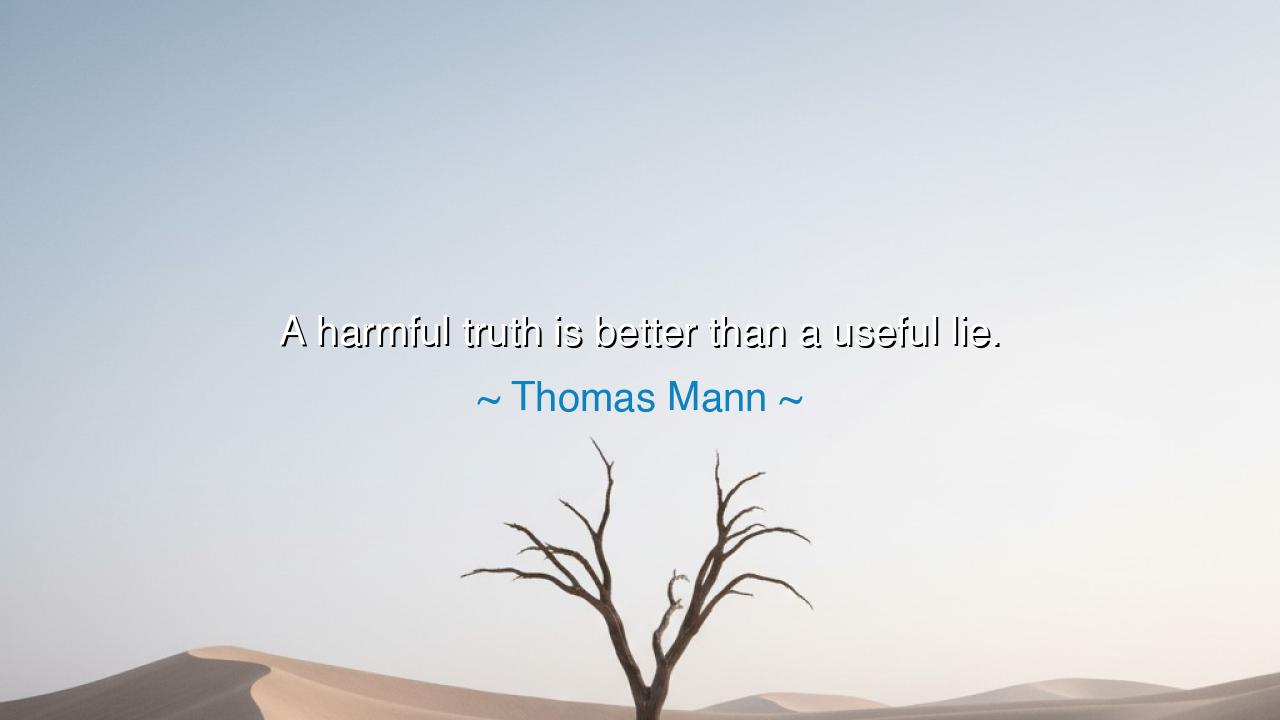
A harmful truth is better than a useful lie.






Hear, O seekers of wisdom, the stern yet merciful counsel of Thomas Mann: “A harmful truth is better than a useful lie.” In these words resounds the eternal struggle between comfort and honesty, between the sweetness of deception and the bitterness of reality. Many would choose the lie, for it soothes like warm wine, it shields like a cloak in the storm. Yet the lie, though useful, is a fragile reed; it cannot bear the weight of time. The truth, even when it wounds, is a rock that endures.
The ancients knew this well. They taught that the gods despised deceit more than weakness. For weakness may be forgiven, but falsehood corrodes the soul. A useful lie may bring temporary peace, may spare a heart from grief, may even protect kingdoms from chaos. But what is the cost? When the veil is torn, as it always is, the hidden rot is revealed, and the wound festers deeper than if it had been cleansed at first by the sharp knife of truth. Thus Mann reminds us: better to suffer in honesty than to prosper in deceit.
Consider the fate of Socrates, who could have saved his life by flattery and lie. When the city of Athens demanded that he recant his teaching and bow to false gods, he might have spoken words to appease, useful words that would preserve his breath. Yet he chose the harmful truth, declaring that he would rather obey the divine voice of conscience than men. He drank the hemlock with serenity, and though he died, his truth endures through centuries, while the lies of his accusers crumbled like dust.
But contrast this with Richard Nixon, whose web of useful lies in the Watergate scandal was spun to protect power, reputation, and control. For a time, the deception held, shielding him from the storm. Yet the storm broke nonetheless, and the lies became chains that dragged him into disgrace. The truth, though harmful to his pride and position, would have been far lighter than the crushing shame of falsehood exposed. Here history shows us: the lie promises safety, but delivers ruin.
Mann’s words strike also at the heart of daily life. How often do we, out of pity or fear, hide truth from those we love? We say, “All is well” when sickness grows, “You are strong” when weakness shows, “I agree” when our heart rebels. For a moment, we preserve harmony. But these useful lies are seeds of mistrust, and when they sprout, they poison love itself. Better the harmful truth, spoken with courage and tenderness, than the silence or falsehood that withers the bond of souls.
To live by truth is not to wield it as a weapon, nor to delight in cruelty. The harmful truth must be tempered with wisdom, spoken at the right time, with compassion in the voice and healing in the hand. But spoken it must be, for only truth cleanses, only truth heals, only truth lasts. Even the harshest truth can become a foundation for strength, while the softest lie is but shifting sand beneath the feet.
So, my children, learn the lesson: choose truth, though it cut like a blade, though it burn like fire. Do not trade eternity for comfort, nor integrity for advantage. A lie, however useful, is a shadow; truth, however harmful, is light. And though the light may blind at first, it will guide your steps more surely than the false glow of deception.
Practical is this path: in your speech, let honesty be your rule; in your dealings, let clarity be your bond; in your heart, let truth reign, though it cost you dearly. For the pain of a harmful truth passes, but the stain of a useful lie endures. Walk in the way of truth, and though the road be steep, your soul will be free, and your name will stand unbroken in the memory of generations.






LLLuong Luong
I wonder if this quote pushes us toward an idealistic view of truth—one where honesty trumps everything, even if it hurts. But what happens when telling the truth in a harsh or blunt way leads to more harm than good? Shouldn’t there be a balance? Is it possible to be truthful in a way that minimizes harm, or do we risk becoming cold and unfeeling in our pursuit of absolute truth?
LPLinh Pham
Mann seems to value the purity of truth, but is it always the case that truth leads to better outcomes than a well-intentioned lie? There’s a sense that truth is tied to moral clarity, but what happens when that truth leads to suffering or distress? In the real world, how often do we choose truth over the comfort of a lie? Can we say that honesty is the best policy if it breaks hearts or destroys peace?
HMHa Mai
What if the truth, in its harmfulness, causes irreparable damage? Wouldn't there be times when the usefulness of a lie is worth considering, especially if it prevents harm? Does Mann's perspective imply that honesty is always the highest moral ground, or is it more about personal integrity? Are there any situations where lying could actually be the morally superior choice, or is this quote suggesting that truth, even if painful, is the only ethical path?
AT33.Nguyen Anh Tai
This quote brings up an interesting dilemma: Is the truth, no matter how harmful, always preferable to a lie, even if that lie serves a practical purpose? Can we really handle the truth when it hurts, or does the utility of a lie sometimes outweigh the pain of an uncomfortable truth? Is it possible that we would be better off with the lie in some situations, especially when it comes to protecting relationships or maintaining peace?